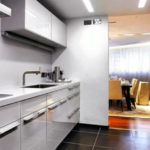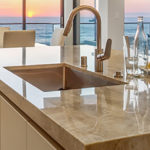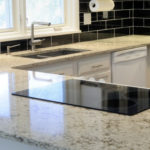Pompei Quartz
Is a natural surface material made from pure and natural quartz. It is bound with resin, inorganic pigments and manufactured …

Advantages of Pompeii Quartz Products:
• Easy Care – just wipe with soap & water
• Extremely Dense, Reducing Absorption, Cracking & Chipping
• Highly Resistant to Heat, Scratches & Abrasion
• Extremely Stain Resistant
• High Resistance to Chemicals & Acids
• Highly Resistant to Mold, Mildew & Bacteria
• Limited 15 Year Warranty.

Resin based compound stone products which mainly consists of: – Innumerable particles of Quartz, which are set very close to each other thanks to use of the exclusive BRETONSTONE SYSTEM technology of vibro-compression under vacuum. – A structure which is formed by chains of polymers that wrap themselves around each individual particle of quartz and then, once the chemical links have been set, binds them permanently together by means of an adhesion promoter. Such a promoter adheres to the molecules of quartz through a silicon- functional bond and to the chains of polymers by way of an organic-functional bond. The result is a compound material, not existing in nature, which represents an ideal product for modern building industry. 
Care & Maintenance
Bench Tops & Floors
Pompeii Quartz is a high quality solid non porous product that is resistant to scratches, heat, and stain however; Quartz is not heat, stain and scratch proof. Quartz requires minimum maintenance and the following care and maintenance guidelines will help to keep the surface in immaculate condition for years
General routine care and maintenance

Quartz is highly resistant to stains caused by fruit juices, liquid food coloring, coffee, tea, wine, grapes, soft drinks, paints, nail polish and remover, automotive fluids, and permanent makers. If any of the above is spilt on the top/floor, immediately wipe off the stained area with any commonly available multi-purpose cleaner or household detergent and then with ordinary water. For more stubborn spills and stains, repeat the procedure several times and use a household scouring pad to remove the stain. It is possible that some of the stubborn stains may leave a light mark or very slight discoloration on the stones. The high gloss finish and extremely low moisture absorption of Quartz fully eliminates the need for any sealing.
Preventing damage to bench tops from heat
Quartz is designed and manufactured to withstand moderate heat but the product is not heat proof. The Thermal – shock resistance is increased with the increase of the used thickness of the Quartz, a slab with the thickness of 3 cm is more resistant than a 2 cm slab. Like any other composite material, Quartz may be damaged by a sudden or lasting exposure to high temperature, mainly at the edges and cutouts of the product resulting in cracks. To prevent thermal shock, discoloration or other damages, it is necessary to use insulating pads when putting hot objects on the surface to open flames and prolonged contact with very hot pots. We always recommend using a hot pad or trivet, especially when using cooking units such as electric frying pans, crock pots, or toaster ovens.
Use of common kitchen implements
Common kitchen implements including sharp knives won’t harm the Quartz, as it is made up of pure natural quartz particles. Continued use of kitchen knives on the bench tops could dull the polished surface. Care should be exercised when moving heavy objects and avoid dropping heavy kitchen tools
Removing foreign materials
If food, chewing gum, nail polish, paint or any other foreign matter is found sticking to the top/floor, simply scrape away with a sharp blade or sharp plastic scraper. The metal surface used in scraping the dirt may leave grey metal marks on the surface, and ordinary scouring pads can easily remove them. Wash and rinse the surface in the normal way with water.
Exposure to chemicals and solvents
Quartz can be permanently damaged by prolonged exposure to strong chemicals and solvents. It is advisable not to use hydrofluoric acid, any product containing trichlorethane or methylene chloride and paint strippers.
Exposure to direct sunlight
Quartz slabs and tiles, when exposed to direct sunlight may result in color change and warping, it is advisable to avoid direct sunlight over a prolonged period on the surfaces.
Maintenance of floors
Dust, grit and barrier materials from the floors should be removed on a daily basis by sweeping with a soft brush and when necessary by use of machine. Sand can scratch the Quartz based tile floors and the surfaces should be always kept free from dust, sand and soil. Quartz surfaces can be easily cleaned with warm water and mild household detergent, using a standard mop. Make sure the floor is completely dry before allowing people to walk on it.
Maintenance of Honed Finish
Honed finish surfaces require more daily maintenance and care than the polished surfaces. The area exposed on a honed finish is more than the polished surface; hence any dirt, markings and scratches would be more obvious on a honed finish surface then on a polished surface. These makings can be removed using non abrasive cleaning products.
Resin based compound stone products which mainly consists of: – Innumerable particles of Quartz, which are set very close to each other thanks to use of the exclusive BRETONSTONE SYSTEM technology of vibro-compression under vacuum. – A structure which is formed by chains of polymers that wrap themselves around each individual particle of quartz and then, once the chemical links have been set, binds them permanently together by means of an adhesion promoter. Such a promoter adheres to the molecules of quartz through a silicon- functional bond and to the chains of polymers by way of an organic-functional bond. The result is a compound material, not existing in nature, which represents an ideal product for modern building industry.
Care & Maintenance
Bench Tops & Floors
Pompeii Quartz is a high quality solid non porous product that is resistant to scratches, heat, and stain however; Quartz is not heat, stain and scratch proof. Quartz requires minimum maintenance and the following care and maintenance guidelines will help to keep the surface in immaculate condition for years.
General routine care and maintenance
Quartz is highly resistant to stains caused by fruit juices, liquid food coloring, coffee, tea, wine, grapes, soft drinks, paints, nail polish and remover, automotive fluids, and permanent makers. If any of the above is spilt on the top/floor, immediately wipe off the stained area with any commonly available multi-purpose cleaner or household detergent and then with ordinary water. For more stubborn spills and stains, repeat the procedure several times and use a household scouring pad to remove the stain. It is possible that some of the stubborn stains may leave a light mark or very slight discoloration on the stones. The high gloss finish and extremely low moisture absorption of Quartz fully eliminates the need for any sealing.
Preventing damage to bench tops from heat
Quartz is designed and manufactured to withstand moderate heat but the product is not heat proof. The Thermal – shock resistance is increased with the increase of the used thickness of the Quartz, a slab with the thickness of 3 cm is more resistant than a 2 cm slab. Like any other composite material, Quartz may be damaged by a sudden or lasting exposure to high temperature, mainly at the edges and cutouts of the product resulting in cracks. To prevent thermal shock, discoloration or other damages, it is necessary to use insulating pads when putting hot objects on the surface to open flames and prolonged contact with very hot pots. We always recommend using a hot pad or trivet, especially when using cooking units such as electric frying pans, crock pots, or toaster ovens.
Use of common kitchen implements
Common kitchen implements including sharp knives won’t harm the Quartz, as it is made up of pure natural quartz particles. Continued use of kitchen knives on the bench tops could dull the polished surface. Care should be exercised when moving heavy objects and avoid dropping heavy kitchen tools
Removing foreign materials
If food, chewing gum, nail polish, paint or any other foreign matter is found sticking to the top/floor, simply scrape away with a sharp blade or sharp plastic scraper. The metal surface used in scraping the dirt may leave grey metal marks on the surface, and ordinary scouring pads can easily remove them. Wash and rinse the surface in the normal way with water.
Exposure to chemicals and solvents
Quartz can be permanently damaged by prolonged exposure to strong chemicals and solvents. It is advisable not to use hydrofluoric acid, any product containing trichlorethane or methylene chloride and paint strippers.
Exposure to direct sunlight
Quartz slabs and tiles, when exposed to direct sunlight may result in color change and warping, it is advisable to avoid direct sunlight over a prolonged period on the surfaces.
